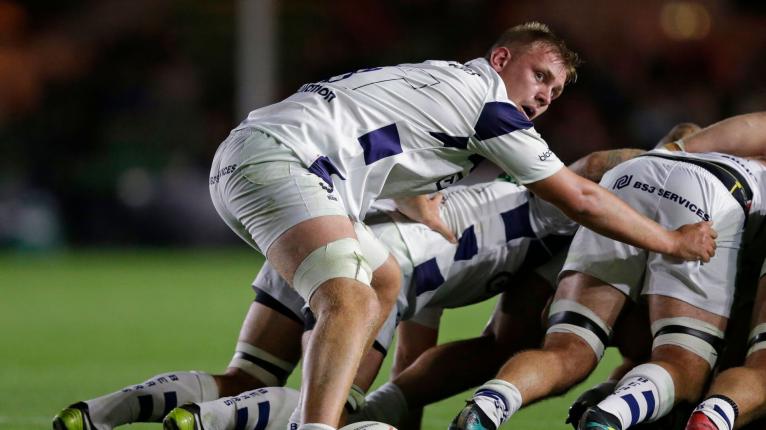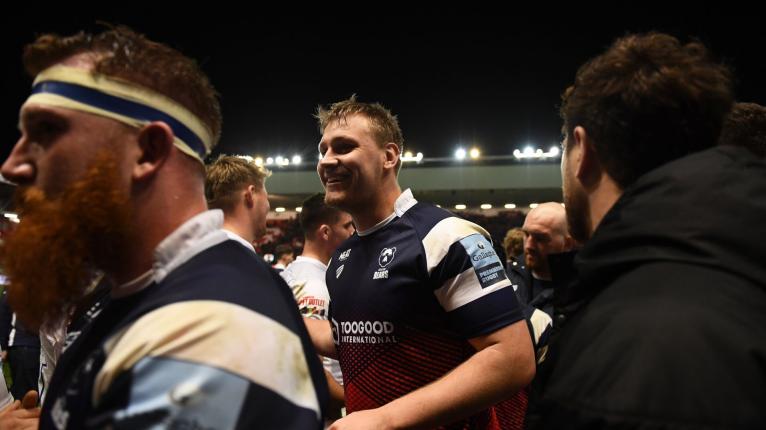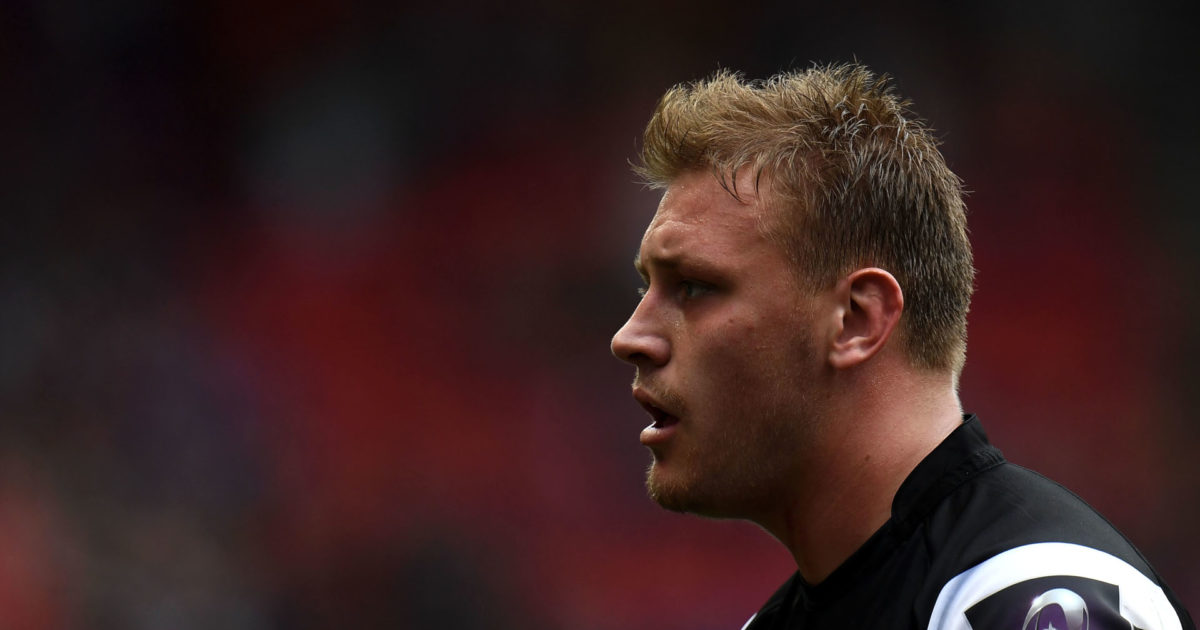'Mum, I'm ok, but I've just been diagnosed with cancer - it's in my neck'

It wasn’t the hours of chemotherapy, the violent retching, the exhaustion, or the mental trauma of tackling Hodgkin’s Lymphoma that stung Joe Batley deepest – it was a phone call. On the day of his diagnosis, the giant lock sat in a Bristol pub with Bears doctor Jonathan Williams, supping an orange juice and trying to fathom how, as a supremely fit 21-year-old, he was now a cancer patient.
Hodgkin’s Lymphoma is a rare form of the illness that develops in the lymphatic system, spreads through the body and by corrupting white blood cells, inhibits its ability to fight infection. Suddenly, this scourge had shrouded Batley’s sparkling future in doubt. What would become of him? Although, mercifully, the cancer had been spotted in its relative infancy, would he get back playing again? If he did, would he be the same player? More immediately, how on earth would he tell his doting mother that her boy was so sick?
“That phone call was the hardest thing out of everything I did,” he says. “Just not knowing what to say, having to go into it with, ‘Mum, I’m ok, but I’ve just been diagnosed with cancer – it’s in my neck, I’ve also got a lump in my armpit, but we’ve caught it early’.
“I was just trying to off-load as much information as possible, but I knew that the only thing she’s head is that I’ve got cancer.
“That was the main thing that was going through my head after getting the news – how the hell am I going to tell my family? And then after that it was, how am I going to play rugby again?”
This was in the February of 2018, days after Batley had helped Bristol to a colossal win over Championship promotion rivals Ealing. He had earned England caps at Under-18 and U20 levels, and moved from Gloucester to join the squad Pat Lam was assembling for their tilt at the second-tier title.
He knew already what it was to be seriously injured. In his age-grade days, he was dropped from a soaring line-out leap and wrecked three of the four cruciate ligaments operating his knee, the upshot being a 13-month stint out of the game. There is a clear pathway for the stricken player, a rehabilitation programme to follow and little goals to nail, but this was an altogether more brutal, unwieldy and menacing foe.
It was in the Monday morning gym session after that howitzer of a contest with Ealing that a team-mate spied a lump protruding from Batley’s neck.
“The doc said it looked like it would be an ingrown zit, which would have been hanging, but a lot better than what it actually transpired to be,” he says. “Just to be sure, he made me an appointment at the hospital the next day. I didn’t think anything of it. The doctor examining me said she wasn’t happy with the lump and thought it could be this thing called Hodgkin’s Lymphoma. I had no idea what that meant.
“She wanted to do a biopsy. At the time, that felt fine, because I didn’t really know what a biopsy was – I honestly thought it was like a questionnaire or something – and then this massive needle came out, and I thought, oh, this is getting a little bit more serious now.”A week later, the results came back and the awful news was confirmed. Chemotherapy began almost immediately. Every ten days, Batley would spend seven hours hooked up to the drips, a labyrinth of tubes ferrying drugs into his body to wage war on the cancer cells.
“The first few days, I’d just be violently sick, have no energy, be stuck to my bed except for maybe one walk that I’d try and drag myself through,” he says.
“The sick part was the worst. The first one I did, I didn’t even get home before I was sick. I had to get my girlfriend at the time to pull over so I could be sick. My body was rejecting everything. That made me not hungry because I didn’t want to be sick anymore, I wasn’t doing much exercise, so my body wasn’t making me hungry, and I was just starting to waste away.

“After a few days, I had the energy to try and build my strength up, so I’d try and do a little bit of gym near the end of the ten days, one or two gym session, only 20 minutes long, more for my mental health. So yeah, I’ve done something, I’m not going to be as weak as if I didn’t do anything.”
During these bleak sessions, Batley received a cascade of visitors. His housemates, Dan Thomas and Jack Cosgrove, would come up to the hospital and tease him mercilessly as his hair rapidly disappeared. Charlie Beckett, his old pal from Gloucester and a wrestling enthusiast, would regale him with stories of which steroid-infused bruiser had taken possession of the WWE intercontinental belt.
“I didn’t want any different treatment; I wanted us to take the mick out of each other, like any normal 21-year-olds would,” Batley says. “It was nice – Dan and Jack came in and didn’t hold back, they called me hanging for having mingin’ hair or whatever.
“Charlie came to every chemo session – he was amazing. He loves Marvel and wrestling, so even if I wasn’t able to talk, he’d just tell me what he’d seen on Marvel or what happened on Monday Night Raw.

“A load of players kept popping up. My mum and dad still ask after [Edinburgh and Scotland number eight] Nick Haining, because he was so nice to them. A few of these boys I’d only known for one year, they showed me so much support and so much love. It shows you how quickly you can form bonds with people in a team environment like rugby. Players leave every season, but when those boys moved on, it was especially tough for me. I still keep in touch with all of them.”
Amongst all of this, Batley sought the wisdom of Darren Dawidiuk, the former London Irish hooker who beat testicular cancer shortly before the lock’s diagnosis. On Dawidiuk’s advice, he adopted a plant-based diet, even purchasing a water purifier so he could monitor what he ate and drank in almost obsessive detail.
“I knew exactly what was going into my body, so I could be accountable if anything went wrong,” Batley says. “It gave me a bit of a control issue, so I knew exactly what was happening.
“Maybe I felt like I’d been betrayed by something and it’s given me cancer, so I was making sure that whatever went into my body from now on wasn’t going to feed the cancer, it was going to cure it.”
In the end, the dismal weeks of treatment had the desired effect. Batley was declared in remission four months after finding that lump. In the hospital waiting room where he had lingered so many times, he rang the bell to herald himself cancer-free, and in that moment, a near-palpable yoke of anxiety melted from his shoulders.
“There’s a video of it and you can kind of see a lot of worries and stress just disappear,” he says. “It probably only lasted 10 seconds but it felt like it was hours.
Cannot thank everyone at @BristolBears enough for my time over the last three years. I’ve had my personal ups and downs during this time but the amount of love and support has been overwhelming. The club and fans will always have a special place in my heart. https://t.co/h07Kupf9WE
— Joe Batley (@banterwithbats) May 13, 2020
“It was just an amazing, amazing feeling that I can’t quite put into words properly – the sheer relief and realisation that life is going to be normal again. The week after that, I was able to start increasing the intensity of training, by the end of August I’d done a few contact sessions and then I was able to play in A-league games.”
For almost as long as he can remember, Batley had thirsted to become a Premiership player. With Bristol promoted and the cancer vanquished, Pat Lam gave him his league debut at Harlequins in March last year.
“I had a few tears with my dad, just the realisation that the thing I’d wanted had finally happened after all the challenges and the setbacks,” he says.
“It was just an absolutely mental few years. I’m glad it happened because it’s definitely shape me to be the person I am now, and I’m extremely grateful because it just shows who matters to me, who took the time.”
Ultimately, first-team minutes were hard to come by. Batley had fallen down the pecking order and with Bristol going well, it was fiendishly hard to claw his way back up again. He went on loan to Leicester Tigers, and was just beginning to motor when the Covid-19 pandemic struck and rugby was placed in a state of indefinite suspension.
When he next plays, it will not be for the Bears or the Tigers, but for Worcester Warriors, who have signed him on a one-year contract for the new campaign, whatever that may look like. In moving to Sixways, he follows two of his most treasured mentors, forwards coach Jonathan Thomas and scrum specialist Mark Irish, who had already committed to the switch from Bristol.
“I’ve got a one-year deal, which puts pressure on, I’ve got to perform and hit the ground running,” he says.
“Being a second-row, the way JT changed Bristol’s line-out was massive for me. And Iro managed to get a full forward pack as passionate about the scrum as a prop is. He even got backs involved so that if we got a yellow card, we knew exactly who would join the scrum and we wouldn’t ever get a Jonny May moment.
“They just change the way they deliver messages. Different challenges keep you motivated – we had six weeks where we weren’t allowed to concede a maul try or a certain number of penalties per game, and if we did that, we were allowed a night out as a forward pack for beers and a meal. They are so enthusiastic and both have not long stopped playing in the grand scheme of things.”
The cancer has changed Batley – of course it has. He only turns 24 next month, but he has started thinking seriously about his future, getting coaching qualifications under his belt and studying strength and conditioning to allow him to stay in the sport as long as possible.
“With this lockdown, I’ve been able to just slow down, have a quiet moment thinking, yeah, that was mental, maybe I didn’t appreciate it enough at the time,” he says.
“Rugby is all I’ve ever wanted to do, but it’s not going to be forever. When you’re 21, you think that’s a 30-year-old’s problem, but I’ve had a big injury and a big illness.
“That’s the biggest thing that changed in the mentality – not just living in the here and now and always thinking about what the future may hold. And I don’t want to waste any energy not being positive and not doing what I want to do.”
These past few rugby-less weeks have been a time of serenity, the first chance he’s had to reflect on the darkness and the light of his journey. When the action returns, Joe Batley will be ready.















